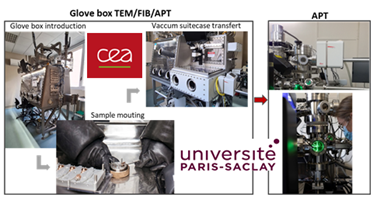NOMATEN ONLINE-SEMINAR March 28: Nuclearization of atom probe tomography and the workflow analysis: Atomic-scale characterization of neutron irradiated materials.
NOMATEN ONLINE-SEMINAR
online: https://www.gotomeet.me/NCBJmeetings/nomaten-seminar
Tuesday, MARCH 28th 2023 13:00 CET
Nuclearization of atom probe tomography and the workflow analysis: Atomic-scale characterization of neutron irradiated materials.
C. Hossepied1, I. Mouton2
1 Université Paris-Saclay, CEA, Service d'Etude des Matériaux Irradiés, 91191, Gif-sur-Yvette, France
2 Université Paris-Saclay, CEA, Service de Recherches Métallurgiques Appliquées, 91191, Gif-sur-Yvette, France
Abstract:
Atom Probe Tomography (APT) enables access to compositional, morphological and structural information from microstructural features at the atomic scale. This information is especially important on neutron-irradiated material to characterize chemical composition variations around point defect clusters or grain boundaries.
The LECI hotlab facility at CEA Saclay in France, is equipped with a nuclearized APT in combination with APT specimen preparation for neutron-irradiated materials. The APT analysis needs a needle shape specimen (with curvature radius 50nm) by using either electro-polishing or Focused Ion Beam (FIB).
This work is a major stake for CEA/DRMP (Material and Physico-chemical Research Department) that includes several steps, such as the manufacturing of a glove box, the instrumental nuclearization of the APT in association with the nuclear safety and radiation protection. This project includes also the nuclearization of sample preparation devices, integrated in shielded glovebox/cells, that is designed to prepare massive electropolished or FIB samples from radioactive material. The transfer and activity control between each unit from sample preparation devices to APT were also optimized in other to increase the final analyses yield. The work presented here will highlight the impacting factors when designing a nuclearized APT, as well as the limitations and difficulties when undertaking such a project.
The first analyses of radioactive material has been performed and several studies are already planned on different nuclear irradiated materials such as fuel cladding, reactor vessel... Some examples of such APT analysis will be presented.
This work has benefited from a state aid managed by the National Research Agency under the program "Investments for the future" with the reference ANR-11-EQPX-0020.
Keywords: APT, nuclearization, nuclear material, microstructure.
Bio:
Dr. Coraline and Dr. Isabelle are Atom Probe Tomography (APT) managers at CEA Saclay. This scientific equipment is shared between several R&D laboratories that include 15 users. The researchers lead characterizations on nuclear materials before and after neutron irradiation with an emphasis on nanostructural investigation with APT.
For more than 10 years, Coraline works on neutron irradiated materials and has acquired a great insight into it, from experimental challenges to administrative constrains due to the hotlab environment.
Isabelle has a large expertise in APT studies, as before joining the CEA, she earned a PhD at the University of Rouen and completed her experience with postdoctoral positions at CEA Grenoble and Max-Planck institute in Dusseldorf with subjects always related to the APT equipment.
For 4 years, Coraline and Isabelle have been combining their skills and successfully managed to nuclearize the APT equipment in 2022. This recent success opens up a wide range of possible future analyses on neutron-irradiated materials at the nanometric scale
Figure 1: Several steps performed in the glove box to introduce the final sample into the APT for analysis.







